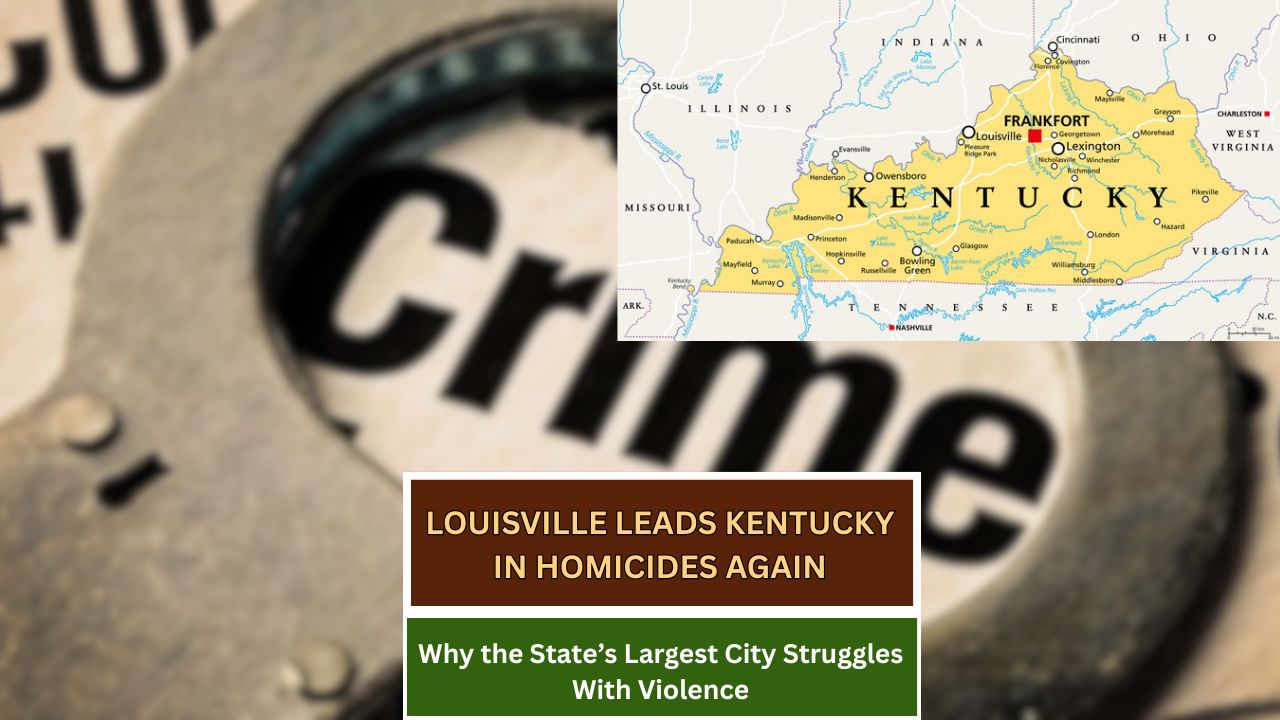Louisville, Kentucky, continues to lead the state in homicides, earning the unofficial title of Kentucky’s murder capital. Despite slight improvements in crime data over the past two years, the city remains plagued by high homicide rates and persistent gun violence, far outpacing other cities in the state like Lexington.
A Troubling Trend: Louisville’s Homicide Numbers Remain High
According to official data from the Louisville Metro Police Department (LMPD), Louisville recorded 150 homicides in 2023, making it the fourth consecutive year the city surpassed the 100-homicide mark. Though this figure reflects a minor drop from 157 murders in 2022, it still paints a concerning picture of violence in Kentucky’s largest city.
The city’s all-time homicide record was set in 2021, with 188 murders, a grim milestone that still haunts Louisville’s communities.
In 2024, the city showed slight progress, logging 143 homicides, according to WLKY. However, public safety advocates and law enforcement officials agree that while the numbers have declined modestly, the root causes of violence remain largely unaddressed.
Gun Violence Still a Daily Threat
Homicides are only part of the violent crime equation in Louisville. Gun-related incidents continue to burden the city’s healthcare system, law enforcement resources, and community well-being.
In 2023, Louisville reported 403 nonfatal shootings, down from 440 in 2022 and 633 in 2021, as per data compiled by WLKY. This reduction is seen as a step in the right direction, but with more than one shooting per day on average, the numbers remain unacceptable to many residents.
A Stark Contrast: Lexington’s Safer Streets
While Louisville continues to struggle with violent crime, Lexington, Kentucky’s second-largest city, presents a stark contrast. As of April 2023, Lexington had recorded only five homicides, according to data shared on Reddit. The difference highlights the severe disparity in public safety conditions between the two cities.
Lexington’s smaller size and different policing strategies may account for its lower crime rates. However, it also points to systemic issues in Louisville, including concentrated poverty, gang activity, and limited access to mental health resources.
What’s Being Done to Address the Violence?
Efforts are underway to reverse Louisville’s reputation as the murder capital of Kentucky. The Louisville Metro Police Department has implemented new crime prevention strategies, including enhanced community policing, surveillance technology, and expanded patrols in high-crime areas.
Local officials have also launched community outreach programs focused on conflict resolution, youth mentoring, and violence interruption. Initiatives like the Office for Safe and Healthy Neighborhoods aim to tackle the root causes of violence by providing social support and alternatives to crime.
In a statement earlier this year, Louisville Mayor Craig Greenberg emphasized the city’s commitment to safety: “Reducing violence is not just a law enforcement issue—it’s a community issue. We must all be part of the solution.”
Statewide Crime Reports Show Louisville as Outlier
The Kentucky State Police “Crime in Kentucky” report (2023) provides a broader view of crime across the state. While other cities and counties also report incidents of violent crime, none come close to Louisville’s homicide figures.
The report cites drug-related offenses, domestic violence, and illegal firearms as contributing factors to overall crime in the state. However, Louisville continues to lead in every major violent crime category, including aggravated assault, robbery, and murder.
Looking Forward: Challenges and Hope
While Louisville has made strides in reducing homicides and shootings, the city still faces serious challenges. Trust between communities and law enforcement remains strained in some neighborhoods, and limited funding for social programs continues to hinder prevention efforts.
Nevertheless, city leaders remain hopeful that with consistent investment in both policing and community services, Louisville can shed its reputation as Kentucky’s most violent city.
“We can’t arrest our way out of this problem,” said LMPD Chief Jacquelyn Gwinn-Villaroel. “It’s going to take all of us working together—parents, teachers, neighbors, and police—to bring real change.”
This article has been carefully fact-checked by our editorial team to ensure accuracy and eliminate any misleading information. We are committed to maintaining the highest standards of integrity in our content.

Outside of work, he enjoys playing chess, following cricket, and writing short stories. His commitment to integrity and in-depth analysis strengthens OTE News’ mission of providing trustworthy journalism.




